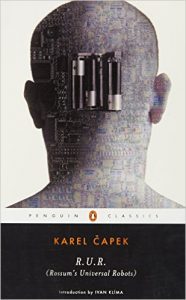Cybernetic bodies are forms of technology that are created to essentially replicate and replace human activity and humans in general. It can also be said that cybernetic bodies create a “perfect” society that makes one gender more dominant than before and allows for others to control them. Cyborgs that are created by other people tend to be autopoietic, meaning that humans can alter and replicate the composition of something or someone to make the cyborg any way that they want. This can be seen through various examples such as Stepford Wives, a movie, R.U.R., a play, and Black Mirror, a show.

In Stepford Wives, the husbands wanted to create a perfect and submissive housewife. They ended up doing this by having a committee observe their wives and the house that they lived in to then replicate the appearance of their wife and create a cyborg version that bases their life around cleaning, cooking, and other house work. The creation of the cyborgs represented the reflexivity or thoughts and values of the husbands, which is usually a “condensed image of both imagination and material reality” (Haraway 292). It also represented the gender and labor roles that were seen as more ideal during this time period. At this time more women were becoming interested in having their own jobs in fields that once were dominated by men; however, the men wanted their wives to have more of a 1950’s mindset where they stayed at home and did stereotypical housework. The men gained more power and control over the wives by replacing them and making them do whatever they wanted, which relates back to the autopoietic mindset.

The domination of women continues to be seen in other works like R.U.R. In this play, Domin, a main character, is portrayed as condescending and is constantly interrupting Helena, another main character, and never seems to let her have her own thoughts. This play only has two women who live inside of the world, which can be viewed as a major problem. Both Helena and Nana face discrimination and are seen as less than everyone else on a regular basis. Helena was forced into a marriage and Nana gets overlooked. The male figures seem to be running the show and never want to listen to what the women have to say or tell them regarding the world they live in and the potential of a cyborg apocalypse, which ends up happening and kills off everyone but one person. The idea of dominating women and making them lesser beings seems to be a norm not only in the society portrayed in this play, but also as a norm between all of the works that we have read so far. Like Lennard J. Davis mentions in his article, “the idea of a norm is less a condition of human nature than it is a feature of a certain kind of society” (Davis 3). Davis poses the question on whether male dominance is just human nature or if it’s a part of society.
As far as Stepford Wives and R.U.R., it appears that dominance is a part of society and rules the way that people live. “Abstraction and illusion rule in knowledge, dominations rules in practice” (Haraway 298). Male dominance was being depicted in these shows, plays, and movies because of it being a norm in our actual society not just a fictional society. These two works are very similar. In both, men try to control the way that the women are viewed and the amount of power they have. Helena, Nana, and all of the Stepford Wives experience that same kind of discrimination and the same kind of power loss. Joanna, one of the wives in Stepford Wives, gets chased by her husband who claims that he just wants to take her to bed, but he’s actually trying to catch her in order to kill her off and replace her. She is also told several times that her passion for photography and art isn’t important. Helena and Nana also face similar situations because they both end up being overlooked and told that they would never have power in their society.

Black Mirror; however, is similar in some ways, but very different in others. The episode that we watched was about a husband and wife. The husband unfortunately dies in a car accident and the wife is left alone, but eventually has a cyborg version of her husband created. There aren’t many labor or gender roles that are portrayed in this episode, but there are a few. When Ash, the husband, arrives in cyborg form, the wife expects him to be exactly like the human version. When he ends up not being as emotional and reactive, the wife gets upset and demands that he acts a certain way. The wife wants cyborg Ash to still do the same things that he did before he died such as housework and being the dominant figure during sex. Since it is a cyborg version of a human, it will never be the same. The wife wanted cyborg Ash to fill an empty spot that she was left with, but wasn’t ready to handle the differences between the two.
“In the posthuman, there are no essential differences or absolute demarcations between bodily existence and computer simulation, cybernetic mechanism and biological organism, robot teleology and human goals” (Hayles 3). Cyborg Ash, in this sense has no difference from human Ash and is essentially doing his job, which is to fulfill a purpose for the wife. From what Hayles is saying, cyborgs are no different than humans. They all have a purpose and should be treated equally. While Black Mirror may not touch on many gender roles, it slightly touches on labor roles in the sense that Ash, both cyborg and human, are seen as a male figure whose sole purpose is to be a husband, help do major housework, make the women feel loved, and please her. However, like mentioned above, when the wife felt as though it was a bad idea to create a cyborg version of Ash since he wasn’t exactly the same, she became frustrated and upset because she wasn’t getting her way.
Even through cybernetic bodies there are gender and labor roles that are being portrayed. Whether it’s men that want to be known as the most dominant and powerful group, men trying to create the perfect woman, or a wife trying to recreate their husband, there are specific qualities that everyone is looking for. Being seen as less and having someone replace you with a cyborg can be scary, just like in Stepford Wives or even R.U.R.; however, if this were to happen, they shouldn’t be treated as anything less than human. Black Mirror, R.U.R., and Stepford Wives all delve into cybernetics and social issues that were seen during specific time periods. With all of these examples we can look deeper and learn more about us as a society while also questioning whether or not cybernetic bodies are going to be part of our future and whether or not they should be treated equally.